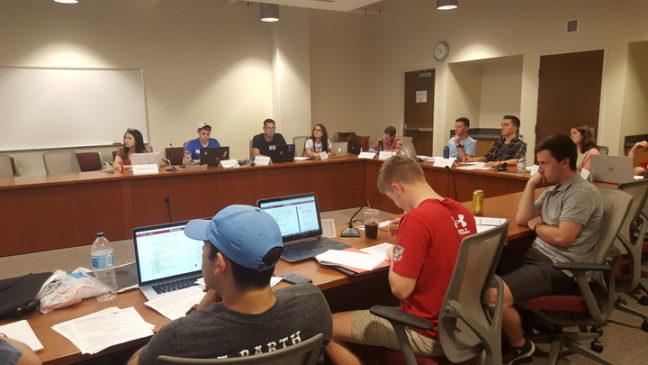The Student Services Finance Committee heard a rocky budget proposal from Native American student organization Wunk Sheek Monday.
SSFC also voted to unanimously approve a budget of $354,566 for student radio station WSUM and $4,493,932 for the Transportation Student Bus Pass Program, which supplies UW students with free Madison Metro Transit bus passes every year.
SSFC also heard the budget proposal from Wunk Sheek. This is the organization’s first year receiving general student services funding.
The budget proposal was conducted by Wunk Sheek’s editorial board, including Tashya Chevalier, Grace Armstrong, Mariah Skenandore and Collin Ludwig.
The organization proposed a budget of roughly $41,000 for 2018-2019, after which the committee questioned the organization’s offered programming.
Rep. Max Goldfarb, along with other representatives expressed concern over what they perceived to be problems with the organization’s core programming. Problems were identified with the attendance and frequency of Wunk Sheek events, which many representatives feared failed to meet funding criteria.
Additionally, several committee members found the organization had reported inaccurate or incomplete information to the committee and further complicated the budget hearing process.
SSFC will vote on Wunk Sheek’s final budget Thursday.
The committee also heard the budget proposal from the Wisconsin Association of Black Men. The organization proposed a budget of $27,318 to the committee, which will be voted on Thursday.
SSFC was also presented with an update on campus mental health for the fall 2017 semester from University Health Services. Angela Janis and Andrea Lawson, co-directors of mental health services at UHS, presented to the committee how mental health services at UHS have changed in the past semester.
UHS started offering single-session counseling services this semester, which are more helpful for students who just want to talk about a certain issue with a counselor, Janis said.
“These are really problem-focused sessions,” Janis said. “Students who call and want to identify with a problem, or talk to their counselor one or two times — they can come in and talk about that problem in that visit.”
Since last semester, Janis said UHS’s ability to complete appointments within two weeks of scheduling has increased by 30 percent. Roughly 48 percent of appointments met this goal last year, compared to the 78.6 percent this year.
Lawson said the addition of scheduled visits this semester has increased UHS’s ability to meet the mental health counseling demands of University of Wisconsin students, as counseling visits have increased six percent since last year.
“We don’t know how much demand is in the system, and we can tell that we haven’t actually met it yet because we’re still keeping these very high rates per week,” Lawson said.
Lawson and Janis also pointed to a new virtual counseling service offered by UHS called SilverCloud, which students can use online at any time of day if they feel a need to. Janis said there are currently 356 active SilverCloud users.
Finally, Lawson and Janis discussed a new service UHS is launching in January of next year called YOU@WISC, a hub which provides information and resources based on things a user is “interested in, worried about, or working toward in his or her college career.”


